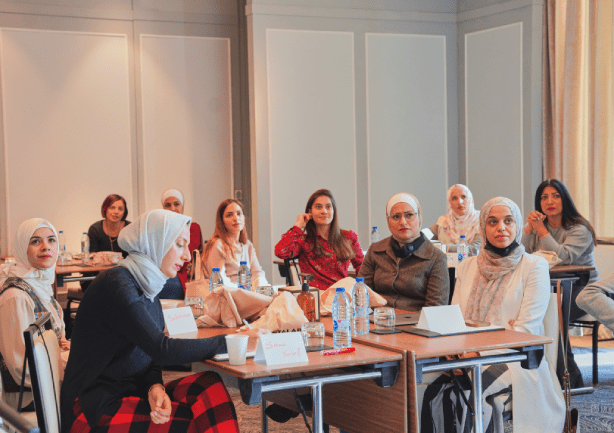- Home keyboard_arrow_right
- Events keyboard_arrow_right
- Is the Global Femtech Industry Empowered Enough?

Is the Global Femtech Industry Empowered Enough? Egypt
Event Starts: Sunday, 11 Sep 2022, 12:00Women’s healthcare looks uncertain in the future. But, the femtech industry is still developing and you’ll find out why.
The lack of research into the health of women led to the need for femtech. Despite the fact that women spend $500 billion on medical costs each year, just 4% of research and development funding was allocated to problems that directly affect women. Cultural taboos that create barriers for women to get treatable illnesses may be directly responsible for this lack of investment in women’s health.
By the end of 2022, the Global Femtech Market is anticipated to be worth USD 28.77 billion. “You know a topic is hot when VC’s money goes into it once they see opportunities in a field,” mentioned Hana Besbes, the Investment Manager at Heal Capital in Germany.
The largest funders of health tech businesses that concentrate on issues affecting women’s health have been early-stage investors. Since 2015, VC funding for the Femtech industry has increased threefold, rising from just over $600 million to about $1.9 billion in 2017, according to CNBC.
In this post, we will be tackling the opportunities, challenges, and recommendations that were mentioned in our panel talk “The Current State of FemTech Worldwide” in partnership with Organon, which took place on August 10, 2022.

Opportunities that could lead to growth in the Femtech industry:
Turning startups from offline to online has its upside due to better visibility, constant accessibility, and brand development. “The next wave of femtech is what Sophie is trying to do here with Nabta Health, in how we can radically change the standard of care of those women,” emphasized Hana.
Companies specializing in gynecology, fertility, and pregnancy have received the most funding. Infertility was identified by the WHO as a disease and a public health issue, and its rate is steadily rising according to CNBC. With the amount of data and studies done on that, it’s been spoken about and therefore investors have an interest in helping startups tackle this issue through funding.
Challenges that professionals face in the Femtech industry:
Speaking of data and studies, there isn’t enough R&D that could help with clinical support. Women are underrepresented in clinical trials, and their concerns have been disregarded in medical device development according to MedCity News. “Deep tech innovation”, as Hanna calls it, is needed. She is looking for a startup that aims to create the biggest bio-market platform for women’s reproductive health. There are many things that could be done once this is achieved.
“We need more data… from their genetic data to their medication, reactions, compliances, and clinical pathways in order to comprehensively improve women’s health outcomes” shared Sophie Smith, CEO and Founder of Nabta Health.
Another challenge is that male investors lack adequate knowledge related to the femtech industry and its impact. With more awareness of the impact of Femtech products, investors, researchers, and business owners have a real opportunity to support this rising innovation trend and usher in a new era in women’s health.
“We need a lot more support from people who understand the need and value proposition of femtech companies at the early stages” shared Sophie.
If you want to close the gap in the Femtech industry, awareness is a crucial first step, but the problem goes far more profound. The industry needs further development in terms of investment in the R&D sector to access more resourceful data which is critical for any startup’s innovative tech product and service. Farah Kabir, Co-Founder of HANX, expressed that founders should discuss their ideas with as many people as possible as early on as they can so they can tweak and produce more wonderful products

If you’re a startup founder, find out what insights our panelists had to share based on their own entrepreneurial journeys:
Nour Emam, the founder and CEO of Mother Being shares this advice since she went through this hiccup of perfecting her service to avoid failing again. So, she decided to lift her business up by expanding and spreading more awareness about what her business is about with partnerships and workshops.
“Move fast even if you fail quickly so you can try again.” shared Nour.
Echoing what Nour said, Eric Dy, the Co-Founder and CEO of BloomLife, adds that a lot of founders choose to start by focusing on the product, which is obviously crucial, but don’t lose sight of your commercial plan. He emphasized this point so founders can remember to understand their market and any potential stakeholders who may need to support their efforts throughout their growth journey.
“You may have an amazing product that a patient might love and support, but without doctors on board or a way for people to pay for it as they normally would, then you’re going to have a hard time. Understand the full pictures and not get super obsessed with just the product ” mentions Eric.
Don’t miss our upcoming Femtech Accelerator Demo Day, a part of our Femtech Accelerator Program in partnership with Organon. It’s the first of its kind in the MENA region where you can have the opportunity to learn more about the industry and the 9 global startups that will pitch their innovative products in various sectors.
You can tune in to the Demo Day which will be live streamed on September 12, 2022 here.
Connect with us on Instagram, Facebook, Twitter, and LinkedIn for more information.
Written by: Dana El Melki


